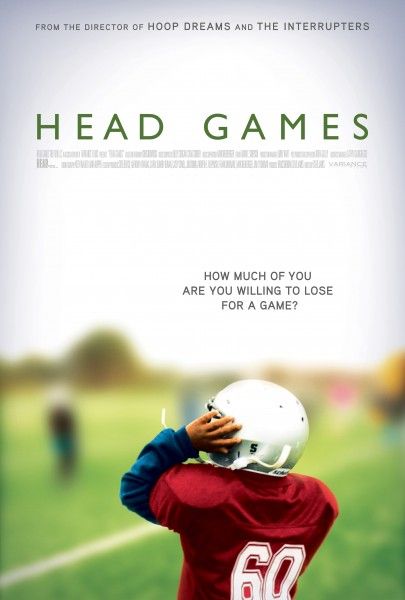Steve James directed one of the best sports documentaries of all time with Hoop Dreams. The film is a thoughtful and emotional look at where the love of the game and its pressures interact with the harsh realities of day-to-day life. Unfortunately, his return to the sports documentary genre, Head Games, simply raises awareness about a topic. It has an important issue at its core—sports-related concussions and the resulting chronic traumatic encephalopathy (CTE)—but James never gets past establishing the problem, restating the problem, and then focusing on whether or not parents should let their kids play violent sports. Head Games doesn't offer any easy answers, but it also doesn't get to the larger questions regarding our enjoyment of violent sports and the financial incentives to keep the status quo.
Head Games consists of two parts. The first part follows former college football player and pro wrestler Chris Nowinski and how he became involved in looking into CTE. James then moves into an extended look at the medical facts behind repeated concussions, and how professional sports, specifically the NFL and the NHL, responded to the issue of player suicides resulting from brain damage incurred during their careers. From there, James transitions to the non-professional world of sports and kids who are suffering from concussions. A common theme is the lack of awareness, and victims being unable to know if they even received a concussion and the exacerbation of injuries due to either ignorance or indifference on behalf of coaches and trainers.
Because Head Games keeps its focus so narrow, the movie begins to feel redundant. James can move from the NHL to NFL, but the issue is still the same—players recite their history of concussions. The only step forward is allowing former professional hockey player Keith Primeau to enter the picture, talk about how he was forced to retire due to his concussions, and now he wonders if he should let his teenage kids continue playing hockey. We then move onto showing how women's soccer also has concussions even though it's not generally considered as violent as the NFL and NHL. These minor movements between sports and players allow James to build a cohesive argument, but the amount overlap between stories slows down the pacing.
There are much larger issues surrounding Head Games that expand the question of violence in sports. Professional football is the most lucrative sport in America and rakes in billions of dollars. If Commissioner Roger Goodell woke up tomorrow and decided to turn the league into touch football, the sport would be abandoned by fans. For all the talk of strategy and execution, the violence is the spice, and while no one wants to be pro-concussion, it's almost a necessary evil. So we're forced to consider why we would enjoy watching this.
James also ignores the financial incentives surrounding these sports. We've all likely heard the common dismissal of athletes who are paid millions of dollars to play a game, but it's not just a game. It's a game where people can be permanently injured. I don't get paid millions of dollars to do my job, but I'm unlikely to get a lacerated spleen sitting at my desk. James briefly touches on how athletes want to be perceived as tough, but the director ignores how no player can simply walk away when there's so much money on the line. How much of your health would you risk and for how much?
Sportscaster Bob Costas breaks the problem down into two simple questions: "What's the level of acceptable risk? And what's the level of reasonable reform?" Sadly, James only applies these questions to little league sports. Head Games could be just as effective by being cut in half, and then shown to parents who are thinking about getting their kids involved in Pee-Wee football or hockey. James never comes right out and says, "Don't let your kids play these kind of full-contact sports," but when he talks to the parents of a high-school player who killed himself and had evidence of CTE, it's tough to imagine the parent who is willing to risk their child's life just so their kid can play a game. Head Games does its job in making its point, but by keeping its focus so contained, the movie limits the power of what it could accomplish in making its audience think harder about hard hits.
Rating: C




